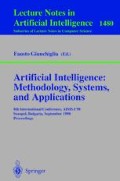Abstract
Representation of uncertain evidence is a recurrent need in the reasoning process, for example to decide among multiple extensions, to detect possible inconsistencies among sources of information, to rank alternatives or goals, and to propagate the information through a reasoning network. Management of uncertain, incomplete and contradictory knowledge has usually been left to ad hoc representation and combination rules, lacking either a sound theory or clear semantics. This consideration is specially relevant in nonmonotonic reasoning, since representation of uncertain evidence has been usually left out of these systems' possibilities. We present a logic that aims to solve formally and pragmatically these representation and reasoning issues. The logic regards incomplete or uncertain evidence about a given situation as information provided by more or less trustable sources. A semantic characterization of the set of conclusions is given, and a derivation procedure is proven sound and complete with respect to this semantics. The system overcomes some common problems arising in nonmonotonic reasoning, such as multiple extensions, inconsistent contexts or reasoning deadlocks.
Preview
Unable to display preview. Download preview PDF.
References
F. Buccafurri, N. Leone, and P. Rullo. Stable Models and their Computation for Logic Programming with Inheritance and True Negation. Journal of Logic Programming, 27(1):5–44, 1996.
Roderick M. Chisholm. Theory of Knowledge. Prentice Hall, Englewood Cliffs, New Jersey, 1977.
Francis Watanabe Dauer. Critical Thinking. Addison-Wesley, London, 1995.
Héctor Geffner and Judea Pearl. Conditional Entailment: Bridging Two Approaches to Default Reasoning. Artificial Intelligence., 53(2–3):209–244, 1992.
Carl G. Hempel and Paul Oppenheim. The Logic of Explanation. Philosophy of Science, 15:135–175, 1948.
John F. Horty, Richmond H. Thomason, and David S. Touretzky. A Clash of Intuitions: The Current State of Nonmonotonic Multiple Inheritance Systems. In Proceedings of the Tenth International Joint Conference on Artificial Intelligence, pages 476–482, Los Altos, CA, 1987. International Joint Conference on Artificial Intelligence, Morgan Kaufmann Publishers.
John F. Horty, Richmond H. Thomason, and David S. Touretzky. A Skeptical Theory of Inheritance in Nonmonotonic Semantic Networks. Artificial Intelligence, 43(1–3):311–348, 1990.
K. D. Kleiter. Propagating Imprecise Probabilities in Bayesian Networks. Artificial Intelligence, 88(1):143–162, 1996.
N. Leone and P. Rullo. Ordered Logic Programming with Sets. J. Logic and Computation, 2(6):621–642, 1993.
Ronald P. Loui. Defeat Among Arguments: A System of Defeasible Inference. Computational Intelligence, 3(3), 1987.
Donald Perlis. On The Consistency of Commonsense Reasoning. Computational Intelligence, 2(1):180–190, 1986.
David Poole. The Effect of Knowledge on Belief: Conditioning, Specificity and the Lottery Paradox in Default Reasoning. Artificial Intelligence, 49(1,2,3):281–307, 1991.
Hendrik Prakken. Logical Tools for Modeling Legal Argument. PhD thesis, Vrije Universiteit, 1993.
Raymond Reiter. A Logic for Default Reasoning. Artificial Intelligence, 13(1,2):81–132, 1980.
Nicholas Rescher. Plausible Reasoning. Van Gorcum, Dodrecht, 1976.
Nico Roos. A Logic for Reasoning with Inconsistent Knowledge. Artificial Intelligence, 57(1):69–104, 1992.
David S. Touretzky. The Mathematics of Inheritance Systems. Morgan Kaufmann Publishers, Los Altos, CA, 1986.
Johan van Benthem. Intensional Logics. CSLI/SRI International, Stanford, second edition, 1988.
Author information
Authors and Affiliations
Editor information
Rights and permissions
Copyright information
© 1998 Springer-Verlag Berlin Heidelberg
About this paper
Cite this paper
Delrieux, C. (1998). Nonmonotonic reasoning under uncertain evidence. In: Giunchiglia, F. (eds) Artificial Intelligence: Methodology, Systems, and Applications. AIMSA 1998. Lecture Notes in Computer Science, vol 1480. Springer, Berlin, Heidelberg. https://doi.org/10.1007/BFb0057445
Download citation
DOI: https://doi.org/10.1007/BFb0057445
Published:
Publisher Name: Springer, Berlin, Heidelberg
Print ISBN: 978-3-540-64993-9
Online ISBN: 978-3-540-49793-6
eBook Packages: Springer Book Archive

